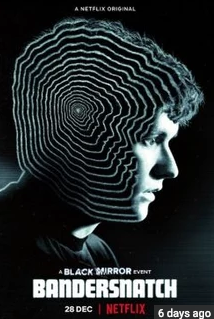
Black Mirror: Bandersnatch release poster. Image from Wikimedia.
Charlie Brooker has done it again.
December 28 saw the release of Black Mirror: Bandersnatch. Bandersnatch serves as a standalone film, apart from the Black Mirror series.
Netflix was already hinting at the idea of a new Black Mirror season or film. Fans were already anticipating new material, since season four of the series was secretly released on December 29, 2017, without any prior announcement. When fans began to search up “Bandersnatch” on Netflix, they were presented with a loading image, a cryptic message underneath saying “be right back,” which is also a reference to the first episode in season two, as it shared the same title. Fans on Twitter did their research and found that the title, Bandersnatch, might be a reference to an game that was set to be released in 1984, but never appeared.
Netflix uploaded the trailer for the film on December 27, announcing that the release date would be the next day. The trailer energized awaiting fans, but also began gaining popularity among those who were not familiar with the series, as the standalone film would be an interactive film, allowing the viewer to guide the story.
The film stars Fionn Whitehead, Will Poulter, Asim Chaudhry, Craig Parkinson, and Alice Lowe. The film is also set in England, in the year 1984. Whitehead plays the character Stefan Butler, a 19 year old programmer who develops an interactive video game named Bandersnatch, an adaptation of his favorite book of the same name, written by fictional author Jerome F. Davies. As he works day and night to finish developing the game and meet the deadline imposed by Tuckersoft’s owner Mohan Tucker (played by Chaudhry), his sanity begins to slip due to his growing feeling of someone controlling his life. Poulter plays the character Colin Ritman, a young, famed video game creator. Ritman is the only character that can understand Butler, as he believes that free will does not exist and the possibility of multiple realities. Lowe plays Dr. Haynes, Butler’s therapist.
It would not be a Black Mirror film if the film did not have some sort of twist. Normally in interactive games, the player acts as puppeteer, controlling the story. However, in Bandersnatch, Butler realizes that he is being controlled by the viewer, even addressing them in some scenes, where he asks the viewer on what to do next. The viewer is driving force of the plot and is the direct reason for his failing mental health.
Now, if I heard that some other show was doing an interactive film, I would have been skeptical on how it would be used to enhance the film. However, I did not feel hesitant at all when I heard that this would be a Black Mirror film, since Charlie Brooker, creator of Black Mirror, has never failed to deliver high quality and well written episodes of the show. The interactive aspect of the game was not treated as a cheap gimmick–it made the story even more interesting, as viewers were allowed to rewatch the film and select other choices to essentially ‘unlock’ footage. The runtime for Bandersnatch is supposedly one hour and a half, according to the Netflix website, but it all depends on the choices the viewer makes, which some viewers going through the film from as little as 40 minutes to even a few hours. My first viewing took a little over two hours, however, it did not feel long, since I was so intrigued and pulled into (quite literally) the film.
It also would not be a Black Mirror film if it did not connect a bigger issue and raise questions about it. The abstract idea that is explored in the film is the concept of free will. The film argues that free will does not exist, which is shown through the viewer making the decisions for Butler, also explained by Ritman through a Pac-Man analogy. It is also shown through the relationship through the viewer and the creators of the film–the viewer has the illusion that they are able to make all the choices for Butler and determine their destiny, but in reality, the viewer does not have that total freedom, as they are presented with the choices that the creators of the film chose to put. The viewer cannot do make the characters do anything outside of the choices given. There were also some choices that could not really work, because they lead to an abrupt ending and the viewer has to go back and choose the other option. I have to give Brooker credit, because he managed to turn a technique that is usually playful and exciting and turned it into something philosophical and serious.
I highly enjoyed the acting in the film, especially the performances of Whitehead and Poulter. Whitehead was utterly convincing as someone who was slowly going insane (even though his suspicions of being controlled was obviously correct). He personified the character well, which was someone with a troubled past who was intelligent, creative, yet awkward and perpetually anxious. Poulter was also great, portraying Ritman as a mysterious, shadowy, philosophical figure who is a genius in not only the sense of computer programming, but also on figuring out the deeper questions in life.
The cinematography is another part of the film that I praise. The shots were vivid and breathtaking, also allowing us to experience the story as if we were actually there. I particularly loved how the scenes where Butler begins to spiral out of control had a washed, almost sickly green look. The scene where Butler and Ritman engage in drug use was beautifully illuminated with neon colors. The costuming was great as well, as the characters are dressed in 80s clothing, but do not look overly obnoxious or stereotypical. There are flashbacks to Butler’s childhood that include his mother in accurate 60s clothing and makeup, which I highly appreciate.
There were some criticism from viewers, specifically fans of the series, who thought that the film did not necessarily have a Black Mirror feel to it, which is connecting philosophy and life lessons with the dark side of technology. Personally, I believe it fits right in with the series. It explores the idea of free will and reality through their interactiveness. The endings are pretty grim as well, which is almost a staple in Black Mirror. It was a little bit more lighthearted than the series, but there are other acclaimed episodes of the show that do not have that much of a dark tone, such as U.S.S Callister and San Junipero.
Overall, the film was exciting, riveting, with outstanding performances by the main cast. The film also had a clever way of incorporating the interactiveness with the plot. I highly recommend it to fans of Black Mirror and anyone else who would be interested in such a thought-provoking film.




